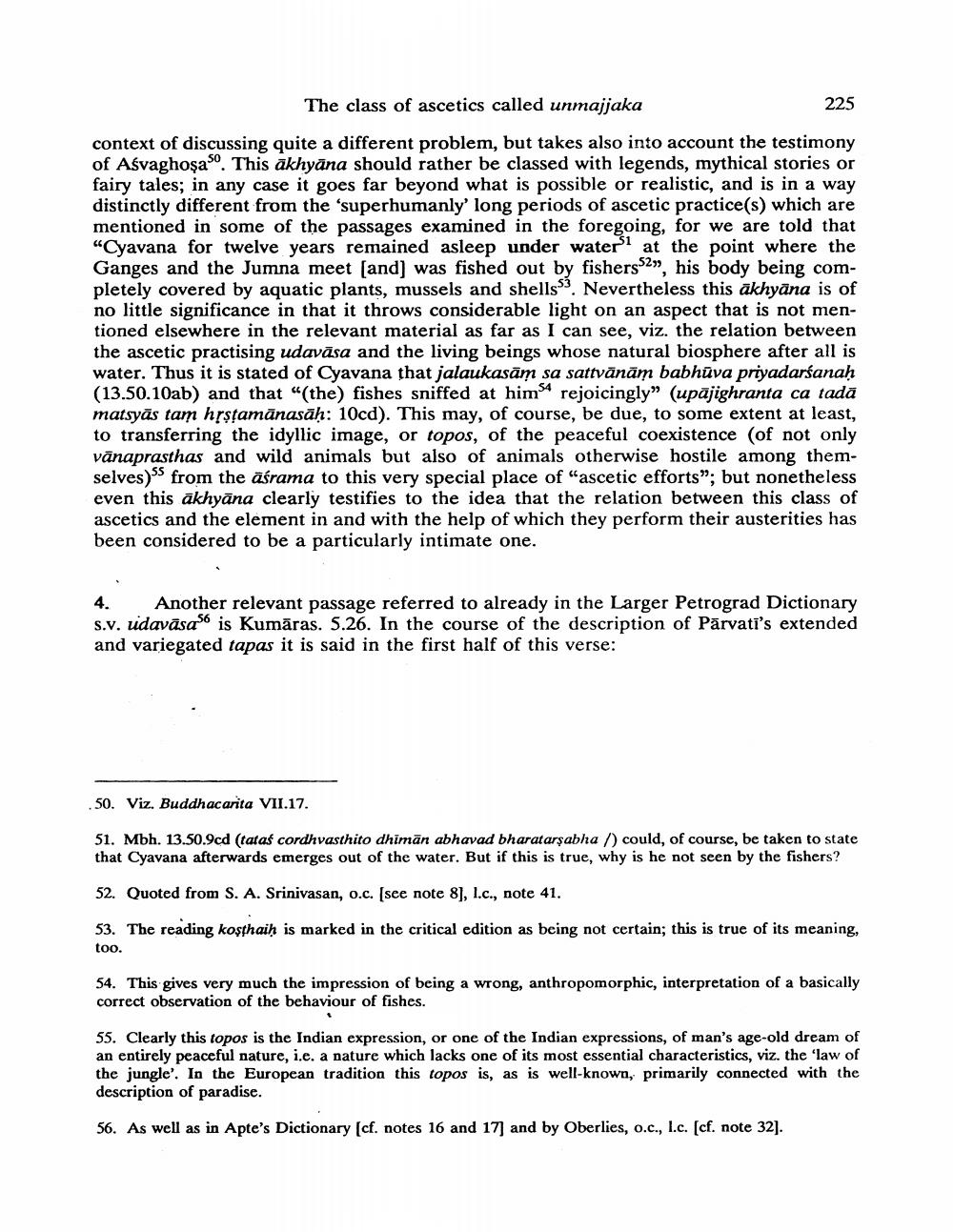Book Title: Note On Class Of Ascetics Called Unmajjaka Author(s): A Wezler Publisher: A Wezler View full book textPage 9
________________ The class of ascetics called unmajjaka context of discussing quite a different problem, but takes also into account the testimony of Asvaghosa. This akhyāna should rather be classed with legends, mythical stories or fairy tales; in any case it goes far beyond what is possible or realistic, and is in a way distinctly different from the 'superhumanly' long periods of ascetic practice(s) which are mentioned in some of the passages examined in the foregoing, for we are told that "Cyavana for twelve years remained asleep under water1 at the point where the Ganges and the Jumna meet [and] was fished out by fishers52", his body being completely covered by aquatic plants, mussels and shells. Nevertheless this akhyana is of no little significance in that it throws considerable light on an aspect that is not mentioned elsewhere in the relevant material as far as I can see, viz. the relation between the ascetic practising udavasa and the living beings whose natural biosphere after all is water. Thus it is stated of Cyavana that jalaukasām sa sattvānām babhūva priyadarśanaḥ (13.50.10ab) and that "(the) fishes sniffed at him" rejoicingly" (upäjighranta ca tada matsyās tam hṛṣṭamānasāḥ: 10cd). This may, of course, be due, to some extent at least, to transferring the idyllic image, or topos, of the peaceful coexistence (of not only vānaprasthas and wild animals but also of animals otherwise hostile among themselves) from the aframa to this very special place of "ascetic efforts"; but nonetheless even this ākhyāna clearly testifies to the idea that the relation between this class of ascetics and the element in and with the help of which they perform their austerities has been considered to be a particularly intimate one. 54 225 4. Another relevant passage referred to already in the Larger Petrograd Dictionary s.v. udavāsa is Kumāras. 5.26. In the course of the description of Pārvati's extended and variegated tapas it is said in the first half of this verse: .50. Viz. Buddhacarita VII.17. 51. Mbh. 13.50.9cd (tatas cordhvasthito dhiman abhavad bharatarṣabha /) could, of course, be taken to state that Cyavana afterwards emerges out of the water. But if this is true, why is he not seen by the fishers? 52. Quoted from S. A. Srinivasan, o.c. [see note 8], l.c., note 41. 53. The reading kosthaiḥ is marked in the critical edition as being not certain; this is true of its meaning, too. 54. This gives very much the impression of being a wrong, anthropomorphic, interpretation of a basically correct observation of the behaviour of fishes. 55. Clearly this topos is the Indian expression, or one of the Indian expressions, of man's age-old dream of an entirely peaceful nature, i.e. a nature which lacks one of its most essential characteristics, viz. the 'law of the jungle'. In the European tradition this topos is, as is well-known, primarily connected with the description of paradise. 56. As well as in Apte's Dictionary [cf. notes 16 and 17] and by Oberlies, o.c., l.c. [cf. note 32].Page Navigation
1 ... 7 8 9 10 11 12 13 14 15 16 17 18 19 20 21 22 23 24 25 26 27
